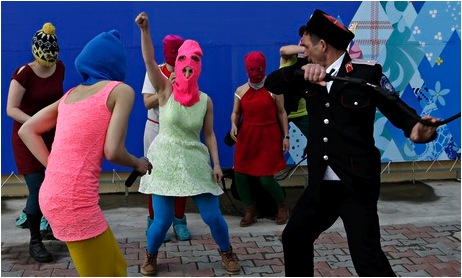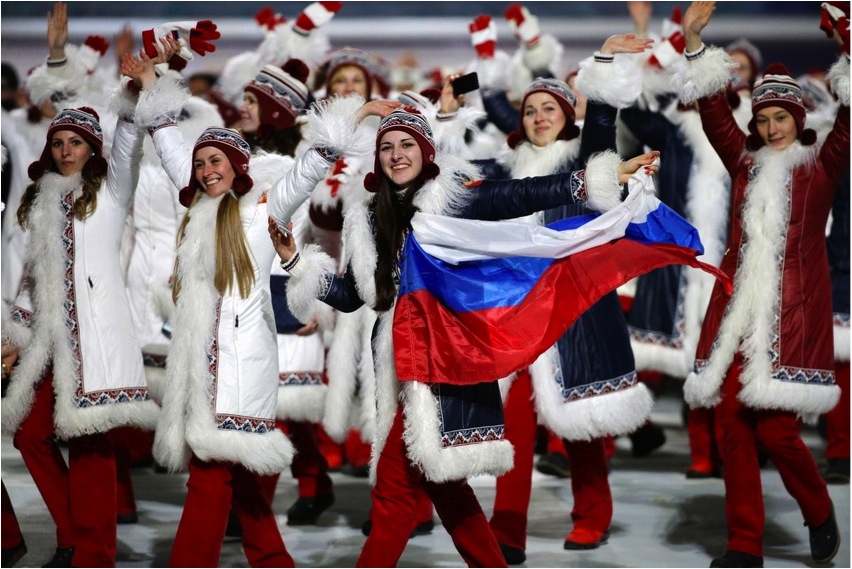
Photo credit: Morry Gash/AP via The Guardian
Earlier today, members of the band Pussy Riot were attacked while performing in Sochi in front of an Olympic banner. According to The Guardian, none were arrested, one was left bloody, and we, U.S. viewers, were given the image above to process. Women in bright colors, women without faces, one woman with a defiant arm raised, one woman holding a microphone and then a man, in an overstated paramilitary uniform, taking a black horsewhip to them. So far, the New York Times is sticking with their skeptical headline “Protest Group Says Cossacks Attacked Them”—uh, says?—despite the volume at which this photo speaks otherwise. In a video that I don’t recommend you watch, more men in uniform arrive to rip the performer’s balaclava masks off, throw them by the elbows to the pavement, beat them with nightsticks on the ground, and attempt to break their guitars.
The olympics are boring. Especially the winter olympics. My interest in them this year is at its nadir. But it’s undeniably addicting to watch the controversy, conversation, and photos unfold all over U.S. news media platforms (and subsequently across the social media verse), eclipsing the stream of non-news that usually takes precedence over international headlines about acts of terrorism, political unrest, and general environmental and economic decline. (Side-note: did anyone else read this main page headline on nytimes.com yesterday and think something serious was happening in the world?).
This is by no means Pussy Riot’s first or last encounter with Russian police, and by now I assume most readers have been keeping track of the band’s headline-making protests against anti-feminist and anti-LGBT policies in Russia. But I can’t help but notice that their version of expression at theses Olympic games, which earlier this week got them detained by police, makes for a stark contrast with that of vocal Americans getting press in Sochi. Specifically, I’m thinking of the flamboyant persona cultivated by figure skating commentator Johnny Weir.
Perhaps because he’s a former athlete, an American, and likely because he’s male, Weir’s sartorial pushback against the confines of Russian mandates for appropriate gender and sexual expression garner him the attention and clumsy praise of style blogs and newspapers, giving interviewers and fellow commentators license to say incredibly stupid, pejorative, but apparently kind-hearted things about him all while hoisting him on a somewhat demeaning pedestal. He earns headlines like “Johnny Weir confirms he coordinates outfits with Tara Lipinski.” But no one comes after him with a whip. Regarding others’ celebration of him, Weir says, "I am not protesting. I am not making a statement. I'm just being myself." He’s not protesting; he’s becoming a celebrity instead.

Image credit: Robert Deutsch-USA TODAY Sports
Fashion is one of the only reasons I watch the olympics. When else do you get to see nations compete on the world stage for best patriotic track suit?! (Russia, the worst by far, dressed all their female athletes as Mrs. Claus.) Scandal is the second reason to pay attention. In the lab, we’re still reminiscing about Tonya Harding and Nancy Kerrigan’s infamous shoelace showdown at the 1994 games. Figure skating is always fun to watch—so many spectacular falls, so little mercy from judges and commentators—but Tonya and her 80s leotards brought it to a new level. Still, treating the outbursts and ugliness at Sochi as more tabloid fodder is a scary proposition, as the photo at the top demonstrates. As Pussy Riot member Nadezhda Tolokonnikova put it in an interview posted earlier today, prior to the attack,
Unfortunately, I must say that it is virtually impossible for an opposition activist to be in Sochi. They simply prevent us from moving around the city. Our cars kept being stopped by traffic police. Once we decided to switch to public transport they came up with a new excuse [to stop us], which is to bring criminal charges against us. Thus voicing any dissent against the policies of [Russian] President [Vladimir] Putin is completely ruled out in this city.


Recent comments
2 years 29 weeks ago
2 years 44 weeks ago
2 years 44 weeks ago
2 years 50 weeks ago
3 years 4 weeks ago
3 years 4 weeks ago
3 years 4 weeks ago
3 years 6 weeks ago
3 years 6 weeks ago
3 years 6 weeks ago